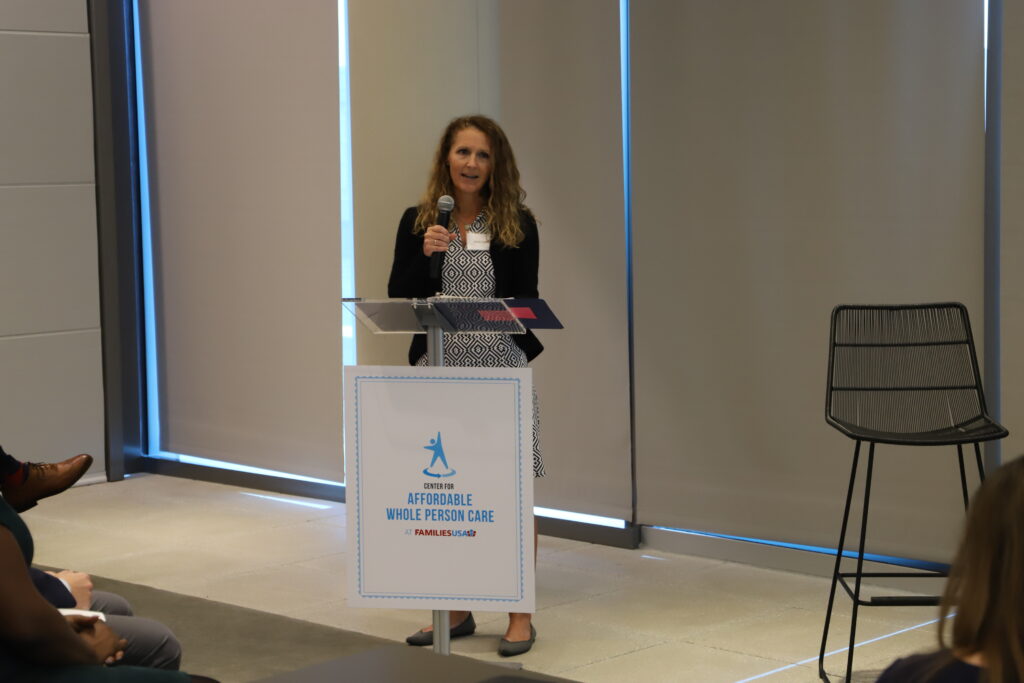
The No Surprises Act faces legal threats. Here’s why you should care
12.19.2022
Nicki Pogue is a healthy person with good health insurance. She even ran a high-altitude race to celebrate her 50th birthday. When Nicki felt ill shortly after she did what any of us in her situation would do – go to the doctor and take some medicine. When she got worse, waking up from a nap with ringing ears, a pounding heart and dizziness, she went to the hospital, got treated and went home.
End of story, right? Not quite. A month later, the San Francisco resident received a $13,000 bill for that brief hospital stay. Her insurance would only cover $3,000, leaving her on the hook for $10,000. Turns out the hospital was out of network. Which no one there had told her. And Nicki understandably didn’t think to ask. “That’s really not what you’re thinking about when you’re having life-threatening symptoms, like ‘hmm, I wonder which of these hospitals might be in my network,’” she said.

Nicki Pogue speaks at an event in October 2022 announcing Families USA’s new Center for Affordable Whole-Person Care
She spent the next five months researching and speaking with health advocates and attorneys. She sent an appeal letter to her insurer and even studied California’s billing laws. Her employer went to bat for her with the insurance company. Eventually, after months of relentlessness from Nicki and her employer, the insurance company paid the bill. Not everyone is lucky enough to have Nicki’s resources or support system. For the millions of people with similar stories, medical debt and financial insecurity are more likely outcomes.
Thanks to the No Surprises Act (NSA), stories like Nicki’s should be a thing of the past. The NSA has been protecting people from unexpected or “surprise” medical bills since the beginning of this year and has already prevented 9 million of these egregious situations that can occur when, through no fault of their own, families receive medical treatment from an out-of-network provider and get slammed with unanticipated health care costs.
But not surprisingly, the law is under attack from industry groups who are more interested in protecting their bottom lines than their patients. They want to roll back its strong protections — including important guardrails that decide exactly who pays how much — that help keep health care costs down and ensure people don’t get stuck with the bill.
To date, provider associations and their allies have filed roughly a dozen lawsuits trying to take down the law. They want to continue using surprise billing as a business model to keep costs high —even though this abusive practice contributes to higher premiums and health care costs for everyone with private insurance. One of these lawsuits is hearing arguments this month in an attempt to undo the Biden administration’s recent updates to the law. The administration made these revisions in response to earlier provider complaints about the law and now these same providers still aren’t satisfied. While the future of this case and the NSA will become clearer in the next few months, what’s evident now is that provider interests won’t be happy until they can go back to the old days of surprise billing – charging whatever they wanted and letting families foot the bill.
Coalitions like Families USA’s No Surprises: People Against Unfair Medical Bills called on Congress to enact the NSA to ban surprise medical billing and ensure that health care costs don’t inflate. And now they are working to ensure the law is implemented the way Congress intended so it can provide families with the financial security they deserve and help rein in industry abuses that lead to inflationary health care costs.
At a time when families are struggling with inflation and rising out-of-pocket costs, keeping the NSA strong and shielded from these greed-based lawsuits is critical. Provider special interests won’t be satisfied until there are no restrictions on how much they can charge patients. We will continue to push back against their efforts to wreak havoc on families’ health and financial well-being by attempting to weaken the law through litigation. Keeping the NSA intact will help ensure getting the care they need and deserve.




